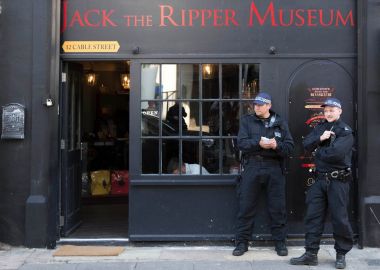Justice and gender-based violence: Why Christians are taking a stand against Jack the Ripper

In his planning application, the man behind London's newest museum promised "the only dedicated resource in the East End to women's history."
What actually opened in September was very different – a moneymaking attraction built around Jack the Ripper, whose murders of East End women continue to intrigue so many tourists.
So far, so predictable. It is hardly the first time a planning application has promised one thing and delivered another. What has been more striking is the local reaction. There have been a series of protests outside the museum. Neighbouring primary schools have objected – they had been promised an educational resource suitable for their pupils. And more than 12,000 people have signed a petition demanding that the museum keep to its initial promises, and "celebrate suffragettes not serial killers."
Why this extraordinary response? After all, remembering the Ripper's murders is not in itself a problem. Such a museum could have offered a depressing but compelling way to spend an afternoon: a way of learning a little more about some famous historical events, and remembering women who have experienced male violence.
The problem is this: the museum offers more of a tribute to the Ripper's cunning than to the women he brutally murdered. It treats those victims as objects of entertainment – reducing the detection of the killer to a sick game. The violence being sensationalised and glamourised in this museum isn't fictional. These were shocking, real life events of a kind that still occur today. Framing the Ripper's murders in this way is an offence to those for whom violence is a real and daily threat. More than two women are killed each week in the UK in gender-based violence by men known to them. Women's accounts of sexual harassment and assault are still undermined by the insinuation that they were somehow 'asking for it' – an insinuation reinforced by some of the museum's own language about the Ripper's victims.
That's why the local Church of England has reached out to neighbours protesting against the museum, working together to plan a protest vigil on Thursday evening. This will end with a memorial service in the historic church of St George-in-the-East. At this act of worship Jack the Ripper's victims will be remembered as human beings with a God-given dignity, and prayers will be offered for women who face violence today.

Our aim is to celebrate the true history of east London: a place where residents stand up against gender-based violence every day, as they have had to for centuries. During the memorial service, St George-in-the-East will be unveiling plans to give the people of east London what the new museum promised: an exhibition that tells the rich and diverse story of its women and their extraordinary courage and resilience. The recently-released Suffragette has shone a new light on the role of East End women in the struggle for equal votes. It's one of many local stories that need to be re-told: among them the stories of Catherine Booth and the Match Girls (who transformed the working conditions in their factory), of female politicians and social reformers such as Minnie Lansbury and Edith Ramsay, and of the women involved in the Battle of Cable Street in 1936.
The way we understand the past affects the way we behave in the present. That's why there is much more at stake here than a dodgy planning application. And it is why the local church is committed to telling the true story of east London's women, with and for its community.
Adrian Newman is the Bishop of Stepney, Abbie Gillgan is a member of the congregation at St George-in-the-East.
The protest vigil will take place outside the Jack the Ripper Museum at 6.30pm on Thursday (26th), with the memorial service at 7.30pm. More details at stgeorgeintheeast.org











